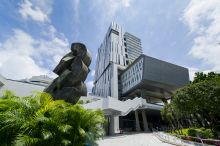The programme aims to provide an opportunity for university graduates in physical science or engineering disciplines to obtain post-graduate level training in physics with highly marketable professional skills specialized in the sub-fields of data modelling and quantum technologies. It also provides an opportunity for scientists and engineers in industry to upgrade their knowledge or skills through pursuing graduate level studies of various topics of physics. The graduates of this programme will gain knowledge of physical principles and how these principles can be applied to practical problems in specific related professions. The training and knowledge provided are suitable for employment in data modelling and quantum technologies in Hong Kong, China and oversea countries. It is also expected that this programme will serve as a bridge providing a good base for students to pursue Ph.D. studies in related fields (Physics, Materials Science, Computer Science, Electrical Engineering, Mechanical Engineering).
Year of Entry
2025Application Deadline
Local & Non-local : 31 Mar 2025Mode of Study
Combined †Mode of Funding
Non-government-fundedIndicative Intake Target
40Minimum No. of Credits Required
30Class Schedule
Mostly on Saturday daytime and weekday evenings (Evening classes usually start at 7:00 p.m.)Normal Study Period
1 year (Full-time mode)2 years (Part-time/Combined mode)
Maximum Study Period
2.5 year (Full-time mode)5 years (Part-time/Combined mode)
Mode of Processing
Applications are processed on a rolling basis. Review of applications will start before the deadline and continue until all places are filled. Early applications are therefore strongly encouraged.Programme Outlines
To be eligible for admission, candidates must satisfy the General Entrance Requirements for postgraduate students of City University of Hong Kong and have:
- an undergraduate degree in a relevant science or engineering discipline; OR
- evidence of academic and/or professional attainments acceptable for this purpose by the University and the Department.
Applicants whose entrance qualification is obtained from an institution where the medium of instruction is NOT English should also fulfill the following minimum English proficiency requirement:
- a score of 79 (Internet-based test) in the Test of English as a Foreign Language (TOEFL)@#; or
- an overall band score of 6.5 in International English Language Testing System (IELTS)@; or
- a score of 450 in the Chinese mainland’s College English Test Band 6 (CET-6); or
- other equivalent qualifications.
@ TOEFL and IELTS scores are considered valid for two years. Applicants are required to provide their English test results obtained within the two years preceding the start of the University's application period.
# Applicants are required to arrange with the Educational Testing Service (ETS) to send their TOEFL results directly to the University. The TOEFL institution code for CityUHK is 3401.
Please refer to the updated admissions website for information.
To complete the programme, students have to acquire a total of 30 credit units (CUs), of which 12 CUs must be acquired from core courses in graduate level general physics, quantum technology, and data modelling. The remaining 18 CUs can be acquired from a list of elective courses.
Core courses:
- Introduction to Quantum Technology (3 CUs)
- Data Acquisition and Processing Skills for Physicists I (3 CUs)
- Machine Learning in Physics (3 CUs)
- Modern Topics in Physics (3 CUs)
Elective courses:
- Modern Characterization Techniques for Materials Physics (3 CUs)
- Frontiers in Physics (3 CUs)
- Data Acquisition and Processing Skills for Physicists II (3 CUs)
- Data Analysis and Modelling in Physics (3 CUs)
- Modern Scattering Methods in Materials Science (3 CUs)
- Advanced Quantum Mechanics (3 CUs)
- Statistical Mechanics (3 CUs)
- Introduction to Biophysics (3 CUs)
- Introduction to Quantum Optics (3 CUs)
- Advanced Instrumentation and Measurement Methods for Experimental Physics (3 CUs)
- Advanced Computational Methods for Simulation and Modelling (3 CUs)
- Mathematical Methods for Scientists and Engineers (3 CUs)
- Physics at Nanoscale (3 CUs)
- Advanced Electrodynamics (3 CUs)
- Advanced Solid State Physics (3 CUs)
- Energy Materials: Physics and Applications (3 CUs)
- Introduction to Quantum Information (3 CUs)
- Advanced Research in Physics (9 CUs)
- The "Advanced Research in Physics" elective course enables motivated students to acquire necessary skills for carrying out cutting edge research in condensed matters physics, quantum information, soft matter physics as well as applied physics in the specialized field of biomedical physics or energy materials physics. This course aims to provide students with valuable research experience and opportunities to publish research papers.






